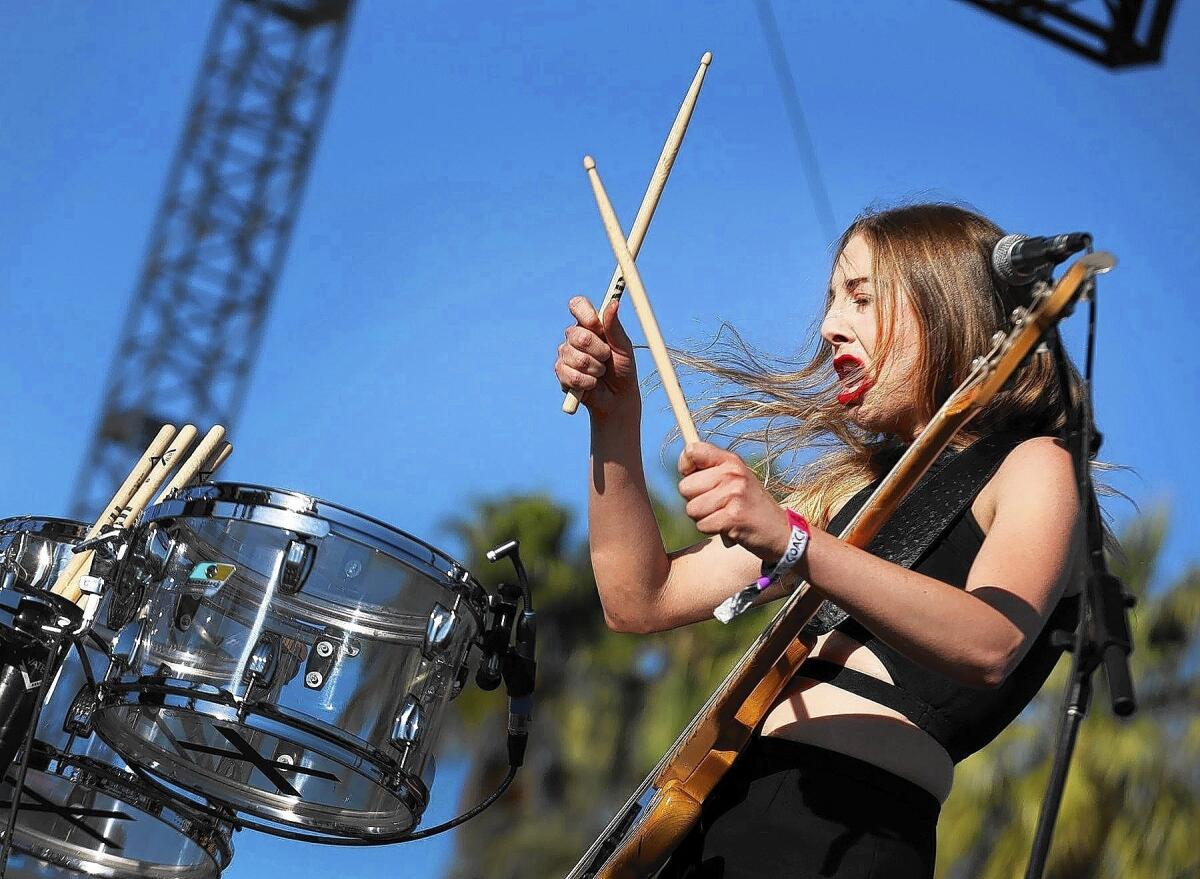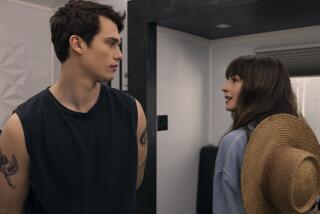Women play second fiddle at summer music festivals like Coachella

- Share via
INDIO, Calif. — Dee Dee Penny, lead singer of the Dum Dum Girls, is no stranger to performing at giant summer musical events. At the first of the two-weekend Coachella Valley Music and Arts Festival events last Friday, her retro-rock act played before thousands of ecstatic fans.
She was just one of an eclectic roster of female artists who galvanized Coachella audiences. Teenage provocateur Lorde dazzled amid a howling dust storm in her summer music festival debut. R&B diva Solange got a surprise assist from her superstar sister, Beyoncé Knowles. Alt-torch singer Lana Del Rey turned in a transfixing trip-hop set. And pop-rock sisters Haim were local conquering heroes as they celebrated the success of their 2013 debut, “Days Are Gone,” which embodies the Coachella spirit by contemporizing retro sounds with hipster/hippie chic.
It’s a benchmark year for Coachella. More solo female artists and all-female bands were on the lineup — 16 — than at any other time in the festival’s history.
PHOTOS: Coachella Day 1 | Day 2 | Day 3
Yet that’s just a fraction of the festival’s 166 acts. While the numbers do improve if one includes Coachella’s 19 co-ed acts, which range from celebrator headliners Arcade Fire, dance-pop trio Chvrches and Penny’s Dum Dum Girls, who recently added a male guitarist to its all-girl crew, that still leaves more than 100 male acts to dominate the bill.
“It’s obnoxious when you show up somewhere and you’re like, ‘Cool, I’m one woman here and there are like 900 dudes,’ ” said Penny, who will return for Coachella’s second weekend. “Of course... I don’t know all of the many things that go into who gets to play. I would hope it’s not as obvious as discrimination.”
In an era when Top 40 radio is led by such pop ingénues as Rihanna, Katy Perry and Taylor Swift, who similarly rule social media with more than 127 million combined Twitter followers, the independent music world stubbornly clings to its reputation as a kind of boys’ club.
“Being a woman on tour, you’re kind of in a man’s world,” said bluesy alt-rocker ZZ Ward, who returns to Coachella this weekend. “I’m proud of every woman playing this festival.”
The challenge of creating a truly gender diverse lineup at Coachella — an event renowned as an egalitarian oasis of progressive politics, where artists disenfranchised by the mainstream can expect to encounter masses of open-minded listeners — remains considerable. Although the number of women on the roster is up dramatically from 2013, when only 10 female performers or all-women acts carried the bill, to date only a handful of women have headlined the festival.
INTERACTIVE: Tell us your Weekend 2 schedule
Representatives for Goldenvoice, the concert promoter responsible for Coachella, declined to be interviewed for this story. But to hear it from other programmers of North American summer music festivals, when it comes to determining the performance line-up, gender diversity often takes a back seat to other practical concerns.
“It has everything to do with who’s available, who’s on tour, who’s released a new record, where there’s a ton of buzz,” said Ashley Capps, founder of AC Entertainment, which co-produces the Bonnaroo Music & Arts Festival and Kentucky’s Forecastle Festival. “If we feel we’re getting too male-centric, we will try to address that situation. But it’s usually last minute when we look at how this is balancing out. We go for the greatest artists available to play at any given festival.”
One could correctly argue that major festivals, such as Coachella or Bonnaroo, are simply following the market’s lead. The summer festival season, like much of the concert industry, is driven by male performers.
As the Coachella crowd vacates Indio on Monday, Goldenvoice will begin prepping its three-day, country-focused Stagecoach Festival. The top-billed artists include Eric Church, Brantley Gilbert, Jason Aldean, Hunter Hayes, Luke Bryan and Florida Georgia Line — all men.
PHOTOS: The past headliners at Coachella
And the Electric Daisy Carnival, a multi-day explosion of dance culture that draws a cumulative attendance of more than 320,000 for its three-day festival in Las Vegas, features more than 100 DJs from the electronic music scene. Yet in recent years the number of women performers could be counted on one or two hands.
Meanwhile, only three of 2013’s Top 10 money-making tours were female-fronted acts, according to Pollstar magazine.
“It’s a matter of who the buzz acts are,” said Gary Bongiovanni, Pollstar’s editor in chief. “At Coachella, that’s something they’re looking at, and many of those buzz acts are fronted by women. But I don’t know if they’re going out of their way to book them.”
Coachella’s male/female discrepancy led the website Buzzfeed to conduct a widely circulated gender breakdown last April of every lineup since the fest’s 1999 inception. It found female-driven acts represent only about 16% of the total bill and concluded that “women musicians have always been severely underrepresented at Coachella.”
While a certain female archetype — young, with center-parted hair and cut-off short shorts — functions as Coachella’s ubiquitous, unofficial mascot, the festival has shown a surprising reluctance to program women as its marquee draw. Since 1999, only one, Icelandic art-pop chanteuse Bjork, has headlined (twice: in 2002 and 2007), with just two other female-fronted, mixed-gender acts — Portishead and Arcade Fire — ascending the main stage for closing slots.
PHOTOS: Quotes from the performers
According to several promoters who asked not to be identified for fear of alienating potential concertgoers, a piece of accepted wisdom from inside the concert industry could help explain why so few female performers are booked as headliners.
“Where the girls go, the guys follow,” one promoter said. “It’s terrible stereotyping. But the people leading the charge in going to see concerts are women. And women don’t want to see other women. They tend to want to see men perform. The audience is fueled by females.”
Allen Scott, executive vice president of Another Planet, the concert promotions firm that puts on San Francisco’s Outside Lands Music Festival, had a business-minded rationale for the gender divide. He said that until about three years ago the industry held the perception that the field of women performers who had a combination of underground credibility and mass appeal — crucial Coachella and Outside Lands’ demographic — was relatively scant.
“In years past, we’d always say to ourselves, ‘We need more female artists on the festival. This feels a little dude-heavy,’ ” Scott said. “It didn’t feel like there were as many to choose from as there are now. It’s becoming a really great time for female-fronted bands.”
Indeed, this year’s lineup boasts a number of multi-genre acts with women in prominent roles, be it rock act Daughters or the boy/girl noisemakers Sleigh Bells. And some of this year’s biggest buzz acts include Lorde and Kate Nash, making this year’s lineup a long way removed from the low ebb for female artists at Coachella. That came in 2001 when only two performers on the bill — Nikka Costa and Andrea Parker — were women (with just three other mixed-gender acts that year).
Even so, the members of the experimental all-female rock quartet Warpaint feel women should view the dominance of male-led acts as a call to arms. While conceding that the group appears in “more fashion spreads than most dude bands,” vocalist/guitarist Emily Kokal theorized that audiences are more likely to be wowed by a female-led band.
“There’s a space for it because it hasn’t been tapped out,” Kokal said. “There is still a little bit of the ‘really good for a girl’ stuff, but if anything, that’s a call to a challenge. We can let girls know that.”
Times staff writer Gerrick D. Kennedy contributed to this report.
More to Read
The biggest entertainment stories
Get our big stories about Hollywood, film, television, music, arts, culture and more right in your inbox as soon as they publish.
You may occasionally receive promotional content from the Los Angeles Times.












